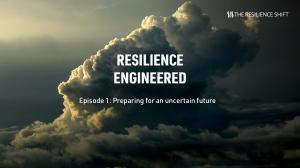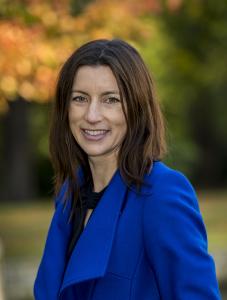New film series tells the world how to be resilient to uncertainty
Leading thinkers including Professor Lord Martin Rees, John Kay, and Dame Judith Hackitt take part in this series of three short films that explore resilience
Developed by The Resilience Shift in collaboration with the University of Cambridge and SWR Media, the films include key interviews and insights from roundtable discussions with leaders from across the world of engineering and climate action, as well as thought leaders and those at the sharp end of building resilience into infrastructure and the built environment, including city leaders from Christchurch, Edmonton, and Durban.
‘Resilience Engineered’ tackles the most pressing challenges associated with 21st Century infrastructure development, with the concept of resilience as the underlying theme. The three episodes focus on topics including managing uncertainty, perceptions of risk, investing in resilience and learning from disaster recovery experiences.
Professor Lord Martin Rees, Centre for Existential Risk, said, “"Because things are changing more rapidly than in the past in a number of ways, we can't be confident that any decision we make will, in retrospect, seem a wise one. On the other hand, we may fail to prepare for a newly emergent threat that wasn't on our risk register at the time. So we've got to accept that planning more than a few decades ahead is much more uncertain than it would have been, say, in medieval times where things change very slowly.”
Episode 1: Preparing for an uncertain future is being launched on 22 September 2021 with a global virtual premiere hosted in parallel with New York Climate Week and followed by a discussion involving panellists including Seth Schultz, CEO, The Resilience Shift, Dr Kristen MacAskill of the Department of Engineering, University of Cambridge, and Mark Hansford, Director of Engineering Knowledge, the Institution of Civil Engineering.
It will then be screened for audiences worldwide over the following weeks, as part of virtual watch parties organised by partner organisations.
The series aims to reach a wide community of stakeholders across infrastructure sectors to create a stronger, connected professional community for making resilient infrastructure a priority. It will provide infrastructure professionals and decision makers in policy, funding and engineering, along with city and business leaders, with a new resource to better comprehend and engage with resilience thinking.
Dame Judith Hackett, Chair Independent Review Building Regulations and Fire Safety UK, said, “We cannot know what the future is going to throw at us but, what I think is really important, is that we do not allow ourselves to get into a position where we don't think about it at all. What we have to do is build resilience into the system and it needs to be resilience for the unknown.”
About the episodes:
Episode 1: Preparing for an uncertain future – provides viewers with a basis for engaging with uncertainty and complexity as meaningful concepts and how this can shape our thinking about the world around us, especially when considering the capability for infrastructure to serve both current needs and those of our future selves (and future generations).
Episode 2: Global issues, local action – explores the opportunities, risks and limiting factors that cities face when making decisions about how to address threats, and the influence of these on decisions around policies and investment, the type of regulation needed, and the setting of international targets and nation state policies.
Episode 3: Don’t wait for a disaster to realise your role to play – explores how disaster recovery provides a “window of opportunity” and what this means for leaders as they tackle the challenge of becoming better prepared for managing major shocks and stresses, whatever and whenever they occur. It provides viewers with insight into the significant leadership, stakeholder coordination and funding that are needed to build resilience.
Dr Kristen MacAskill leads the questioning throughout the three episodes. As Lecturer in Engineering, Environment and Sustainable Development, Cambridge University Engineering Department, and Fellow, St Edmund's College, she wants to get the message across that,
“Resilience is the insurance policy for our world – our future is uncertain and traditional risk modelling used by the engineering community and others are no longer able to take into account all the varying factors and unexpected likelihoods that face us.”
“We must adapt to a new way of thinking so that resilience becomes part of everything we do”, she adds.
Episode 2 will be launching in October, and Episode 3 in November, with the full series being made available as a free learning resource as COP26 opens.
For more information see https://www.resilienceshift.org/resilience-engineered/ or email info@resilienceshift.org
A premiere screening of Episode 1: ‘Preparing for an uncertain future’ is taking place on Wednesday 22 September 2021 17.00-18.00 BST Contact https://us02web.zoom.us/webinar/register/WN_V9XPQ_HQRYqHMvIOlmkLoA to register
To host a screening in your organisation or for your members, please contact info@resilienceshift.org
This series was funded by The Resilience Shift and developed in collaboration with a team from the Department of Engineering, University of Cambridge. Released: 2021
Notes for Editors
About the partners
The Resilience Shift exists to inspire and empower a global community to make the world safer through resilient infrastructure. Supported by Lloyd’s Register Foundation and Arup, the Resilience Shift provides knowledge and tools for those responsible for planning, financing, designing, delivering, operating and maintaining critical infrastructure systems.
Dr Kristen MacAskill, The Resilience Shift, Department of Engineering, University of Cambridge, hosts the programme. Dr Kristen MacAskill is a Lecturer (Assistant Professor) in Engineering, Environment and Sustainable Development at the Department of Engineering, University of Cambridge. She has four engineering-based degrees and before returning to a role in academia, Kristen worked for several years as a consulting engineer in both the water and transport sectors. She now specialises in systems analysis to advance approaches for managing risk and system resilience.
Helen CIvil
The Resilience Shift
7711734456 ext.
helen.civil@resilienceshift.org
Visit us on social media:
Facebook
Twitter
LinkedIn
Resilience Engineered: Episode 1: Preparing for an uncertain future
Legal Disclaimer:
EIN Presswire provides this news content "as is" without warranty of any kind. We do not accept any responsibility or liability for the accuracy, content, images, videos, licenses, completeness, legality, or reliability of the information contained in this article. If you have any complaints or copyright issues related to this article, kindly contact the author above.


